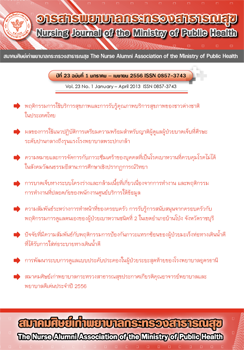ผลของการใช้แนวปฏิบัติการเตรียมความพร้อมสำหรับญาติผู้ดูแลผู้ป่วยบาดเจ็บที่ศีรษะระดับปานกลางถึงรุนแรงโรงพยาบาลพระปกเกล้า
Main Article Content
Abstract
ผู้ป่วยเมื่อได้รับบาดเจ็บที่ศีรษะส่งผลให้เกิดสูญเสียสมรรถภาพทั้งร่างกายและจิตใจ ครอบครัวหรือญาติผู้ดูแลจึงมีความสำคัญอย่างมากในการช่วยฟื้นฟูสมรรถภาพของผู้ป่วย ดังนั้นจึงต้องมีการเตรียมความพร้อมสำหรับญาติผู้ดูแลในการดูแลผู้ป่วยบาดเจ็บที่ศีรษะ การศึกษาเป็นการวิจัยเพื่อการพัฒนาแนวปฏิบัติการเตรียมความพร้อมสำหรับญาติผู้ดูแลผู้ป่วยบาดเจ็บที่ศีรษะ และผลของการใช้แนวปฏิบัติการเตรียมความพร้อม ก่อนจำหน่ายออกจากโรงพยาบาล กลุ่มตัวอย่างคือญาติผู้ดูแลผู้ป่วยบาดเจ็บที่ศีรษะที่มารับบริการหอผู้ป่วยวิกฤตอุบัติเหตุโรงพยาบาลพระปกเกล้า จันทบุรี จำนวน 13 ราย โดยเลือกอย่างเจาะจง เครื่องมือที่ใช้ในการดำเนินการวิจัย 1) แนวปฏิบัติการเตรียมความพร้อมด้านการปรับตัวสำหรับญาติผู้ดูแลผู้ป่วยบาดเจ็บที่ศีรษะ 2) คู่มือญาติผู้ดูแลในการฝึกทักษะในการดูแลผู้ป่วยบาดเจ็บที่ศีรษะ 3) หุ่นจำลองในการดูแลผู้ป่วย และเครื่องมือในการเก็บรวบรวมข้อมูล คือ แบบสอบถามวิธีในการปรับตัวฉบับย่อ แบบสอบถาม (Thai version of Coping and Adaptation Processing Scale-Short From หรือ TCAPS-SF) ที่พัฒนาตามกรอบแนวคิดของรอยแบ่งเป็น 4 มิติย่อย จำนวน 27 ข้อ มีค่าความเชื่อมั่นเท่ากับ 0.87 เก็บข้อมูลระหว่างเดือนกรกฎาคม 2554 ถึงเดือนธันวาคม 2554 และวิเคราะห์ข้อมูล โดยแจกแจงความถี่ ร้อยละ หาค่าเฉลี่ย ส่วนเบี่ยงเบนมาตรฐานการทดสอบวิลคอกซัน (Wilcoxon Signed Ranks Test)
ผลการศึกษาพบว่า คะแนนวิธีในการปรับตัวเพื่อเผชิญปัญหาของญาติผู้ดูแลผู้ป่วยบาดเจ็บที่ศีรษะหลังใช้แนวปฏิบัติการเตรียมความพร้อมสำหรับญาติผู้ดูแลผู้ป่วยบาดเจ็บที่ศีรษะสูงกว่าก่อนใช้แนวปฏิบัติฯ อย่างมีนัยสำคัญทางสถิติ (Z= -3.181 a, p = .000)
จากผลการศึกษาครั้งนี้ผู้ศึกษามีข้อเสนอแนะ คือก่อนใช้แนวปฏิบัติฯ ต้องมีการประเมินความพร้อมและความต้องการของญาติผู้ดูแลก่อนให้ข้อมูลหรือฝึกทักษะการดูแล ซึ่งแนวปฏิบัติฯ เป็นแนวปฏิบัติที่เน้นความจำเพาะเจาะจง (particularly tailored made) กับความเป็นปัจเจก (individualization) ของญาติแต่ละราย ซึ่งทำให้การเตรียมความพร้อมของญาติผู้ดูแลผู้ป่วยที่ได้รับบาดเจ็บที่ศีรษะมีประสิทธิภาพมากขึ้นส่งผลทำให้ญาติมีวิธีในการปรับตัวเพื่อเผชิญปัญหาได้ดีขึ้นเมื่อผู้ป่วยกลับไปอยู่บ้าน
คำสำคัญ : แนวปฏิบัติการเตรียมความพร้อม/ญาติผู้ดูแล/ผู้ป่วยบาดเจ็บที่ศีรษะ
The Effects of Using a Clinical Nursing Guideline for Caregivers’ Preparation in Caring for Patients with Traumatic Brain Injury.
Rungnapha Khiewchaum*
Srisuda Ngamkhum**
Makha Kittithonrakun***
Abstract
Background: Caregivers suffer from both physical and mental disability when caring for patients with moderate or severe traumatic brain injury (TBI). A preparation program may provide information in order to better prepare the caregivers who were taking care of patients with TBI at home.
Objective: The aims of this study were to develop clinical nursing guidelines for preparing the caregivers who were taking care of patients with TBI at home and to examine the effect of using the clinical nursing guidelines.
Method: The study was conducted by a Pre-Post Test Comparison research method. Intotal, the sample included 13 caregivers of patients with TBI. The instrument used in this study were: 1) the protocol for preparing caregivers in taking of patients with TBI, 2) the Boucher guideline for taking of patients with TBI, and 3) the Model for practicing in taking of patients with TBI. The Thai version of the coping and adaptation processing scale–short from (TCAP-SF) was used for collecting data. Data was analyzed by using the frequency, percentage, mean, standard deviation, and Wilcoxon Signed Ranks Test.
Result: It was found that there was a statistically significant difference between prior and after receiving the preparation program (Z= -3.181 a, p < 0.001). After caregivers received the preparation program, they had better coping ability than prior to receiving the preparation program.
Conclusion: The preparation program facilitated caregivers’ coping ability to care for patients with TBI at home. Before providing the program, clinicians should evaluate the caregivers’ needs and skills of caring since the clinical nursing guidelines is tailormade and individualized. Therefore, caregivers will be more effectively prepared and can better cope with potential problems when taking of patients with TBI before discharge and at home.
Keywords: Traumatic brain injury, Caregiver, Coping ability
* Nurse Instructor, Phrapokklao Nursing College Chanthaburi
** Nurse Instructor, Boromarajonani College of Nursing, Sawanprscharak Nakhonsawan
*** Registered Nurse, Phrapokklao Hospital
Article Details
บทความและรายงานวิจัยในวารสารพยาบาลกระทรวงสาธารณสุข เป็นความคิดเห็นของ ผู้เขียน มิใช่ของคณะผู้จัดทำ และมิใช่ความรับผิดชอบของสมาคมศิษย์เก่าพยาบาลกระทรวงสาธารณสุข ซึ่งสามารถนำไปอ้างอิงได้

